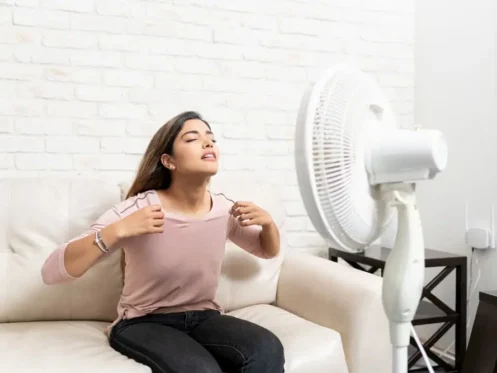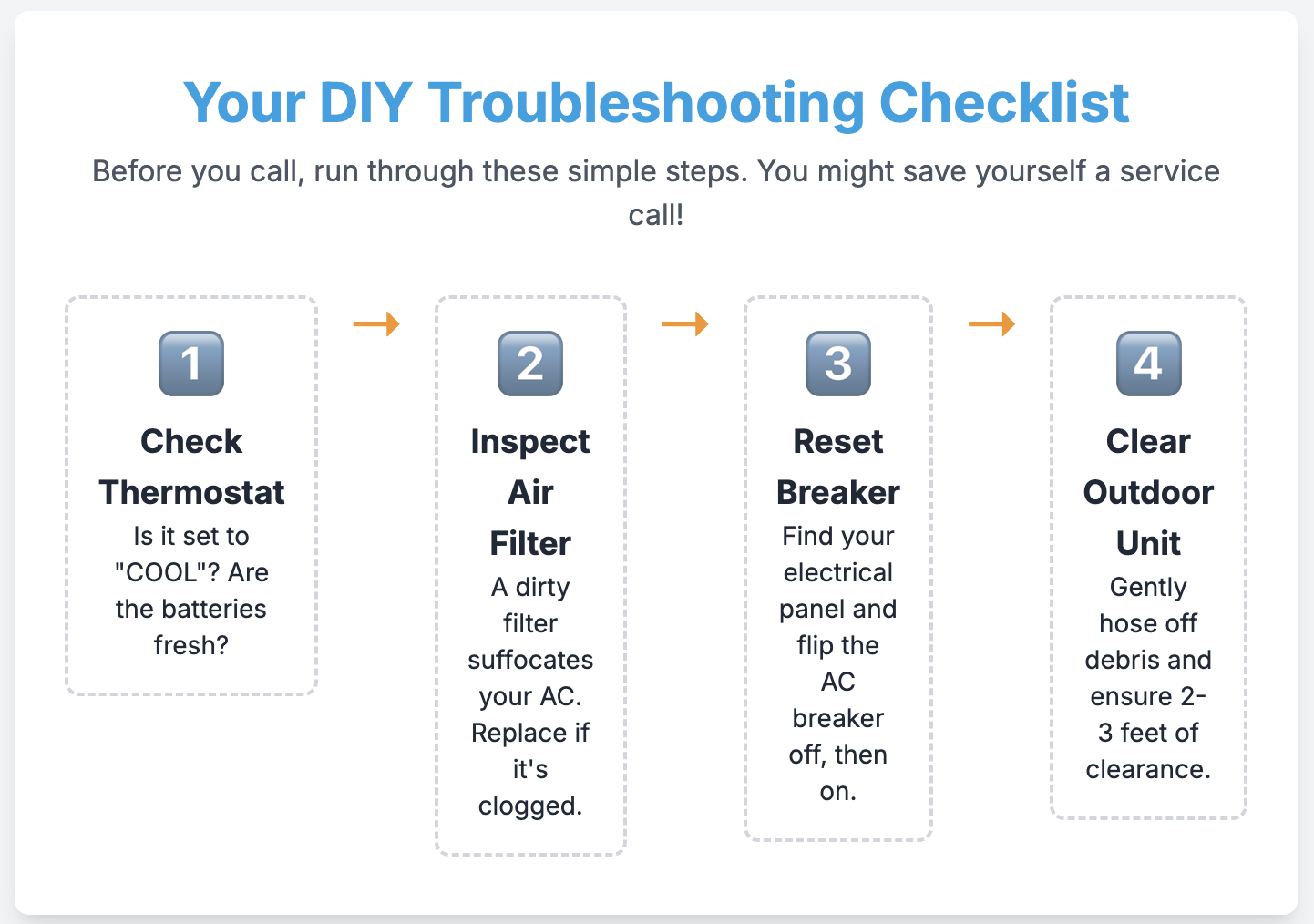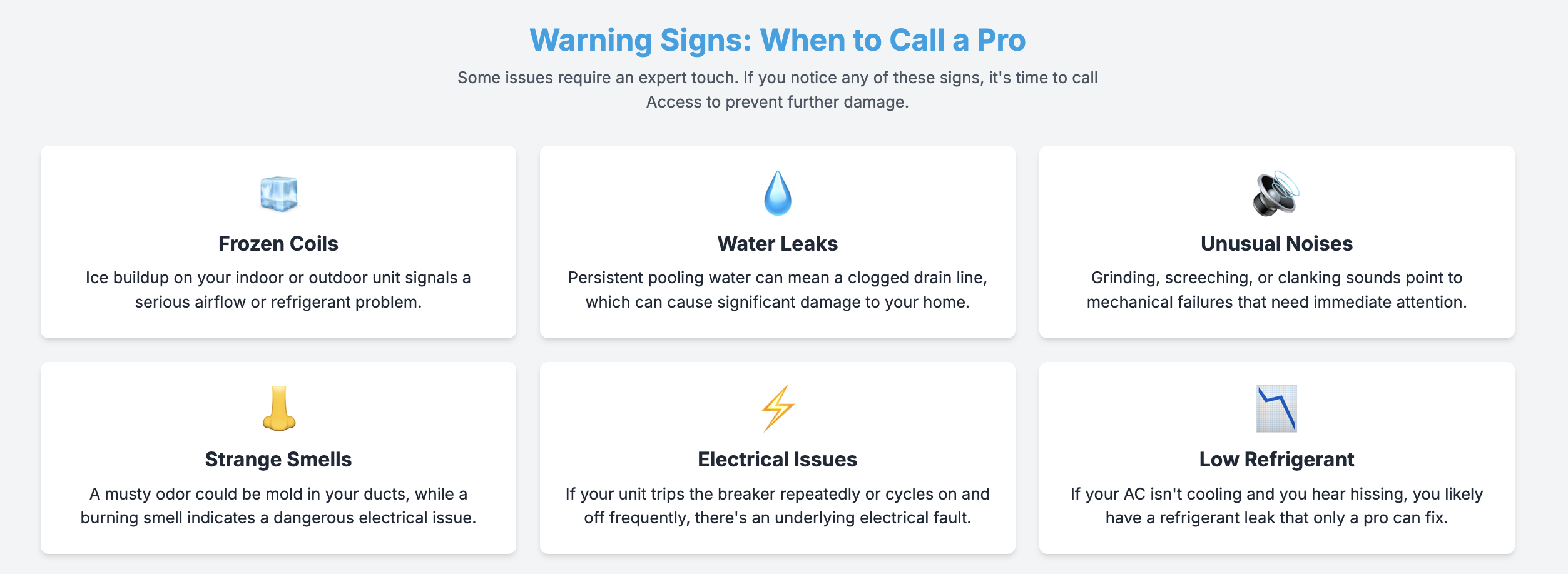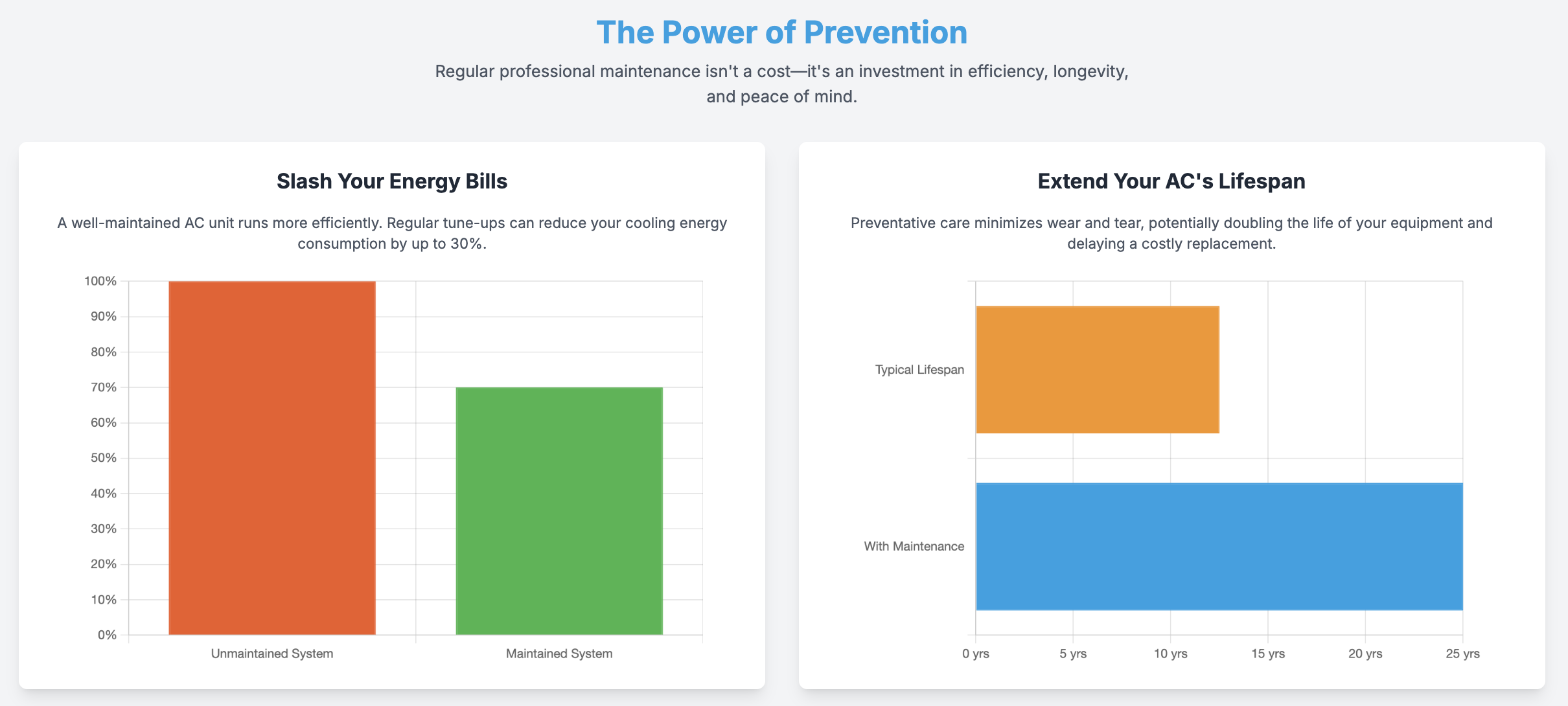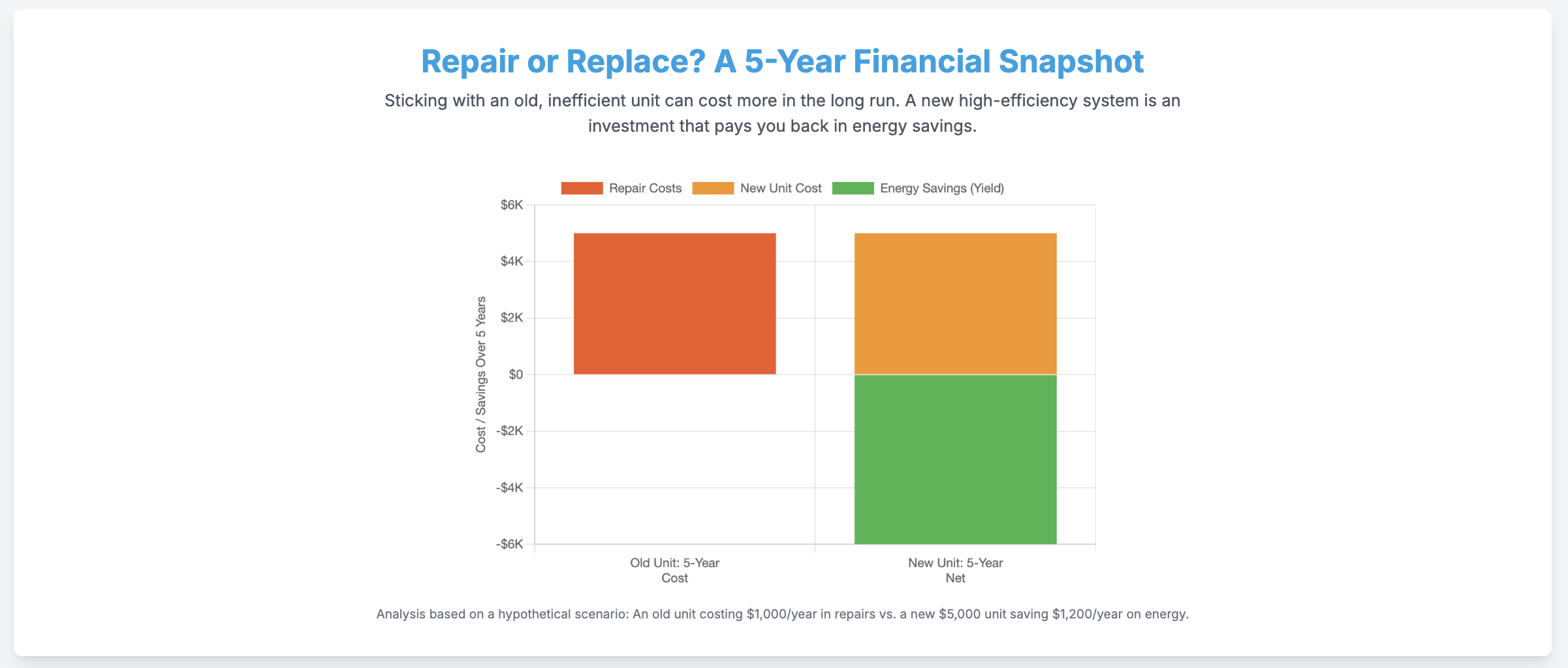Best AC Troubleshooting Tips: Keep Your Cool with Access Heating, Air & Plumbing
The discomfort of an air conditioning unit failing on a hot day is a familiar frustration for many homeowners. While AC problems can be inevitable, many common issues are often manageable with a bit of knowledge and a few simple checks. This guide aims to empower homeowners with the ability to identify typical AC problems, perform basic DIY fixes, and, crucially, understand when it is time to call a professional. Access Heating, Air & Plumbing stands as the trusted local expert, ready to assist with any AC challenge, whether minor or complex, ensuring continued comfort and peace of mind.
Your First Line of Defense: Simple DIY AC Fixes
Many common AC issues can be resolved with quick, straightforward checks, potentially saving time and money on service calls. These are often the initial steps that Access Heating, Air & Plumbing technicians would recommend over the phone.
Check Your Thermostat Settings
One of the most frequent reasons an AC blows warm air or fails to turn on is surprisingly simple: an incorrect thermostat setting. It is a common oversight, particularly after transitioning from winter heating to summer cooling, to forget to switch the thermostat from “HEAT” to “COOL”. If the thermostat display is blank, checking and replacing the batteries can often resolve the issue. Ensuring this basic setting is correct is the very first step in troubleshooting.
Inspect and Replace Dirty Air Filters
A dirty air filter is a leading cause of air conditioning problems, significantly impacting airflow, energy efficiency, and indoor air quality. Symptoms of a clogged filter include low airflow from vents, ice forming on refrigerant lines, a frozen evaporator coil, water leaks from the AC unit, inadequate cooling (leading to hot or cold spots), higher energy bills, and even premature equipment failure.
Visually inspecting the air filter is a crucial step. If it appears dirty or clogged, it should be replaced immediately. Air filters are typically located in the furnace and should be replaced every one to three months, with more frequent changes (monthly) recommended for homes with pets or units that run continuously. A dirty filter effectively “suffocates” the AC unit, forcing it to work harder to pull air through the obstruction. Ignoring this seemingly minor maintenance task can lead to significantly higher energy bills and potential equipment breakdowns. Regular filter replacement is a minor investment that yields substantial benefits, as cleaning air filters can reduce a system’s energy use by up to 20 percent. This seemingly small act of upkeep connects directly to the overall health and efficiency of the entire system.
Reset Tripped Circuit Breakers
If an air conditioning unit fails to turn on, a tripped circuit breaker due to an overloaded electrical circuit could be the culprit. Homeowners can check their main electrical panel for any tripped AC breakers. These should be flipped firmly to the “OFF” position, then back to “ON”. However, a critical warning accompanies this step: if the breaker immediately trips again after attempting to reset it, it is imperative not to keep resetting it. This indicates a more serious underlying electrical issue that demands professional attention to prevent further damage or safety hazards.
Clean Your Outdoor Unit (Condenser)
The outdoor portion of the HVAC system, known as the condenser, is susceptible to debris accumulation. Over time, weeds, dirt, and leaves can build up on the condenser, leading to inefficient cooling, higher energy bills, warm air circulation, and a greater likelihood of frequent repairs. A simple DIY fix involves gently spraying the unit with a hose to remove dirt and debris. It is also important to trim any grass or weeds around the unit and ensure that large objects are kept at least two to three feet away to allow for proper airflow. The impact of cleanliness on efficiency is substantial; dirty coils alone can reduce energy efficiency by 21% or more, and cleaning them has been shown to cut energy usage in half.
Ensure All Air Vents Are Open and Unblocked
A common misconception among homeowners is that closing vents in unused rooms saves money on energy bills. In reality, this practice can damage the AC unit, lead to increased energy bills, cause ice to form on refrigerant lines, result in frozen coils, trigger water leaks, and even contribute to compressor or blower motor problems. All homes experience some air loss through tiny duct leaks. When vents are closed, it increases pressure within the ductwork, which can exacerbate duct leakage and force the AC to work harder to cool the home evenly. Homeowners should walk through their property and ensure that all supply and return vents are open and unobstructed by furniture, rugs, or drapes. This simple check helps maintain proper airflow throughout the system, preventing strain and ensuring efficient operation.
When to Call the Experts: Recognizing Serious AC Issues
While some AC issues can be resolved with DIY fixes, others signal deeper, more complex problems that necessitate the specialized tools, knowledge, and adherence to safety protocols of a professional HVAC technician. Attempting to repair these intricate issues without proper training can lead to further damage, personal injury, or even void existing warranties.
Low Refrigerant Levels & Leaks
Refrigerant is the lifeblood of an AC system, crucial for absorbing heat and facilitating efficient cooling. Low refrigerant levels indicate that the AC is not cooling properly and often point to leaks within the system. These leaks, if left unaddressed, can severely damage the compressor, which is one of the most critical and expensive components of the AC unit. Signs of low refrigerant include a noticeable decrease in cooling performance and the presence of hissing sounds emanating from the unit. Handling refrigerant requires proper equipment and expertise due to its chemical nature and environmental impact. A qualified technician can accurately assess refrigerant levels, detect leaks, add more refrigerant as needed, and determine if the AC unit requires replacement due to severe, irreparable leaks.
Frozen Evaporator Coils
The presence of ice on the evaporator coils is a clear indicator of a serious underlying issue. This problem commonly arises from restricted airflow, often due to dirty air filters or closed vents, or from critically low refrigerant levels. When coils freeze, they cannot effectively absorb heat from the air, which can lead to significant damage to the compressor. If a homeowner discovers frozen coils, the immediate action should be to turn off the AC unit to prevent further damage. While checking and replacing filters or opening vents are initial steps a homeowner can take, the root cause, especially if it involves low refrigerant or complex airflow dynamics, requires professional diagnosis and repair.
Unusual Noises or Smells
An air conditioning unit should operate with a relatively quiet hum. Any strange sounds or unusual smells are distinct warning signs that something is amiss within the system. Understanding these auditory and olfactory clues can provide valuable information for a professional technician. For instance, a hissing sound often indicates refrigerant leaks, while buzzing or clicking noises can point to electrical or relay problems. Rattling suggests loose hardware, a screeching sound may signal issues with the compressor or fan, and whistling often indicates airflow problems. A clanking noise might mean a loose component, and grinding sounds, particularly in older systems, could be due to worn bearings. Similarly, a musty smell when the AC turns on frequently indicates the presence of mold within the air ducts. These specific noises and smells are not just minor annoyances; they are symptoms of mechanical or electrical failures that, if neglected, can lead to complete system breakdown and significantly higher repair expenses. Diagnosing and addressing these issues requires the precise expertise of a professional to prevent further damage and ensure safe operation.
Electrical Control Failures & Short Cycling
When an AC unit frequently turns on and off, produces unusual clicking sounds, or fails to turn on at all, it can be a sign of electrical control failures. These can stem from faulty wiring, corroded contacts, or problems with the compressor. Another common issue is “short cycling,” where the AC unit turns off too quickly. This can be caused by an oversized unit, ongoing electrical issues, or even a dirty air filter. Electrical problems in an AC system are particularly dangerous as they can escalate rapidly, leading to total system failure and posing significant safety hazards. Diagnosing and repairing these intricate electrical components requires specialized knowledge to ensure both the proper function of the unit and the safety of the household.
Persistent Water Leaks
While AC units naturally produce some condensation as they extract humidity from the air, persistent water leaks into the home are a clear indication of a problem. These leaks are often caused by a clogged condensate drain line, a rusty condensate pan, or a dirty or frozen evaporator coil. If water is leaking, the unit should be turned off immediately to prevent costly water damage to the home. Although a homeowner might attempt to clear a clogged drain line with a wet/dry vacuum, persistent leaks often point to issues requiring professional attention, such as the replacement of specific parts or addressing underlying problems like low refrigerant levels.
The Long-Term Play: The Unbeatable Benefits of Professional AC Maintenance
While troubleshooting addresses immediate problems, regular professional maintenance is the cornerstone of long-term comfort, efficiency, and significant savings. It is a proactive investment that consistently yields dividends.
Preventing Costly Breakdowns
Regular tune-ups are essential for identifying and addressing minor issues within the AC system, such as dirty coils or slightly low refrigerant levels, before they escalate into major, expensive repairs or complete system failures. Catching these small problems early on helps homeowners avoid emergency breakdowns and the frantic rush for repairs that many experience during peak cooling seasons. The average air conditioner repair costs homeowners around $319, but some repairs can be as high as $3,000. The vast majority of these costly repairs can be prevented through consistent preventative maintenance, which keeps the system in optimal working condition.
Significant Energy Savings
A well-maintained air conditioning unit operates with greater efficiency, consuming less electricity and consequently leading to significantly lower utility bills. Regular AC maintenance can reduce energy costs by up to 20% to 30%. The impact of seemingly small issues can be substantial; dirty coils alone can reduce energy efficiency by 21% or more. In fact, tests have shown that simply cleaning the coils on an HVAC unit can cut its energy usage in half. Considering that over three-quarters of all electricity used in the United States is dedicated to heating and cooling buildings, and up to 40% of that energy can be wasted without proper maintenance, the financial benefits of regular upkeep become strikingly clear. This demonstrates that preventative maintenance is not merely an expense, but a strategic, long-term investment that yields a high return by avoiding larger, more unpredictable costs.
Extended Equipment Lifespan
Consistent maintenance plays a crucial role in extending the operational life of an HVAC unit, preventing the wear and tear that typically shortens its lifespan. While AC units generally last between 10 and 15 years, routine repairs and tune-ups can potentially extend this lifespan to up to 30 years. Given that a new HVAC system can represent a significant investment, ranging from $5,000 to $20,000, the minor investment in seasonal maintenance to maximize the equipment’s operational years makes sound financial sense.
Improved Indoor Air Quality & Comfort
Beyond temperature control, professional AC maintenance significantly contributes to a healthier living environment. Maintenance tasks, including filter replacement and duct cleaning, effectively remove airborne pollutants, allergens, mold, and mildew, leading to cleaner, healthier air and reduced indoor humidity. Poor indoor air quality can contribute to long-term health issues such as heart disease, cancer, and allergies, and can exacerbate short-term respiratory conditions like asthma. By managing moisture levels, maintenance helps prevent the growth of mold and mildew, thereby reducing the risk of respiratory problems. This connection between AC maintenance and indoor air quality extends the value proposition beyond just temperature control to overall family health and well-being, appealing to a deeper, more personal concern for homeowners.
Maintaining Warranty Validity
Many HVAC warranty agreements include clauses that require proof of regular preventative maintenance to cover expensive parts and replacements. Consistent servicing ensures that the homeowner’s significant investment in their AC system remains protected under warranty, providing an additional layer of financial security.
Repair vs. Replace: Making the Smart Financial Decision
When homeowners face a major AC issue, a critical decision often arises: repair the existing unit or invest in a new one. Making an informed choice necessitates a careful cost-benefit analysis.
Key Factors to Consider
- Age of Your AC Unit: AC units typically have a lifespan of 10 to 15 years. After this period, their efficiency tends to decline significantly, and repair costs often rise due to increased energy consumption and the difficulty of finding parts for older models. An older unit (over 10 years) is more prone to declining efficiency and recurring, costly repairs, making replacement a more viable long-term option.
- Rising Energy Bills: As AC units age, they become less energy-efficient. If energy bills are consistently increasing without a corresponding change in usage patterns, it could indicate that the AC system is wearing out and struggling to perform efficiently. Newer, high-efficiency units can offer substantial savings, potentially reducing homeowners’ energy costs by 20% to 50% compared to older models.
- Cost of Repair vs. New Unit: A general rule of thumb suggests that if the cost of a single repair exceeds $3,000, it is often more economical to invest in a new unit. Continuous repairs can drain finances over time. While a new system has higher upfront costs, typically ranging from $5,000 to $20,000, it offers superior efficiency, often comes with robust warranties, and leads to lower energy bills that can offset the initial investment over its lifespan. It is also important to consider the hidden costs of repairs, such as increased downtime, potential loss of comfort, and higher ongoing energy expenses due to an older, less efficient system.
- Refrigerant Type: If an existing unit still uses Freon (R-22), replacement might be a wise decision. Freon is being phased out, leading to increasing costs and environmental concerns associated with its use and leakage.
- Frequency of Repairs: If an AC unit requires repairs routinely, it signals a deeper, recurring issue rather than isolated incidents. In such cases, investing in a new, reliable system becomes a more sensible and cost-effective long-term solution.
Cost-Benefit Analysis (CBA) Snapshot
A cost-benefit analysis (CBA) provides a systematic approach to evaluating the potential rewards against the costs of an investment, helping homeowners make informed financial decisions. This analysis offers clarity on whether an investment is worthwhile, helps prioritize spending on necessary upgrades or repairs, and identifies potential pitfalls before committing funds.
Consider a hypothetical scenario (based on common figures): A homeowner spends $1,000 annually on repairs for an old AC unit. Alternatively, a new, high-efficiency unit costs $5,000+ but is projected to save $1,200 annually on electricity bills, repairs, and will last up to 20 years.
This example clearly demonstrates that while initial repair costs may appear manageable, they compound over time. In the long run, investing in a new, energy-efficient unit can lead to a positive net financial gain, making replacement a more financially sound decision. The decision to repair or replace is not merely a technical one, but a significant financial and lifestyle choice, and understanding this framework empowers homeowners to make truly informed decisions.
Why Trust Access Heating, Air & Plumbing with Your AC Needs
When DIY fixes are insufficient, or for proactive maintenance, choosing the right HVAC partner is paramount. Access Heating, Air & Plumbing stands as Boise’s premier choice, built on a foundation of trust, transparency, and long-term relationships.
Our Commitment to 5-Star Service
Access Heating, Air & Plumbing is dedicated to providing “5 Star Service”. This commitment is evident in several key areas:
- Highly Trained Technicians: The team, including knowledgeable and personable experts, comprises highly trained, certified professionals with deep expertise. They undergo continuous education and training to stay abreast of the latest technologies and best practices.
- Professionalism & Respect: The company prides itself on being streamlined, honest, and personable, ensuring that clients feel comfortable throughout the service process. A core philosophy is showing utmost respect for both the client and their home.
- Transparency & Upfront Pricing: Access Heating, Air & Plumbing offers service options with upfront pricing, providing detailed inspections and comprehensive documentation, often including photographs, to clearly illustrate findings and recommendations for future maintenance. This level of transparency fosters trust and confidence, directly addressing common homeowner anxieties about hidden costs or unclear diagnoses.
- Quality Over Speed: The company prioritizes quality service and fair prices, ensuring exceptional workmanship that stands the test of time. This approach ensures that every repair and installation is performed with meticulous attention to detail.
The Access Advantage
Access Heating, Air & Plumbing offers distinct advantages that set it apart:
- Over 50 Years of Experience: Serving Boise and surrounding areas since 1972, the company boasts a proven track record of reliability and excellence.
- Prompt Response Times: Access Heating, Air & Plumbing excels in quick scheduling and efficient troubleshooting, ensuring that urgent HVAC and plumbing needs are addressed without delay. The commitment to answering calls any time reflects a dedication to customer availability.
- Customer-First Philosophy: A unique willingness to thoroughly diagnose issues without unnecessary pressure for immediate repairs distinguishes the company. This approach, coupled with a focus on clear communication and tailored solutions, puts the customer’s needs first. This directly counters negative stereotypes about service companies and builds deep trust.
- Guaranteed Satisfaction: Access Heating, Air & Plumbing’s commitment to customer satisfaction is guaranteed, backed by warranties on services provided.
- Community & Ethics: As active members of both the Boise and Meridian Chambers of Commerce, the company has built strong community relationships. It has been recognized with the Torch Award for Ethics for Idaho and holds an A+ accreditation with the Better Business Bureau, underscoring its dedication to ethical business practices and customer satisfaction.
Join Our All Access Care Club
For those seeking to maximize comfort and savings, the “All Access Care Club” offers exclusive benefits:
- Priority Emergency Service: Members receive priority for emergency service, ensuring rapid response when it is needed most.
- $0 Service Call Fee: This benefit, valued at $99, eliminates the cost of initial service calls for members.
- 10% Off All Repairs: Members enjoy significant savings on any necessary repairs.
- Thermostat Guarantee: A valuable benefit, valued at $350, provides peace of mind regarding thermostat performance.
- $650 Off a New HVAC System: Members receive a substantial discount should a new HVAC system be required.
- 2-year Warranty on All Repairs: All repairs for members come with an extended two-year warranty, double the standard, for enhanced peace of mind.
Frequently Asked Questions (Q&A)
How can I tell if my AC is broken?
Look for common signs such as no cool air flowing, issues with the thermostat display (check batteries or power), tripped circuit breakers, or the AC unit simply not turning on despite having power. Additionally, pay attention to unusual noises or smells, and check for a dirty air filter or any persistent condensation leaks.
When should I replace my AC?
Consider replacing your air conditioning unit if it is over 10 to 15 years old, if your energy bills are consistently rising without a change in usage, if you experience frequent refrigerant leaks, or if the estimated cost of a single repair exceeds $3,000.
Why is my AC freezing up?
Most AC freeze-ups are caused by either insufficient refrigerant levels or inadequate airflow to the evaporator coils. Common culprits include a dirty air filter, closed air vents, or dirty evaporator coils. If your AC is freezing, turn it off immediately to prevent further damage, and call a professional if the issue persists after checking filters and vents.
Why is my AC leaking condensation? Should I be worried?
While some condensation is a normal part of the AC’s dehumidification process, persistent leaks indicate a problem. Common causes include a clogged condensate line, a rusty condensate pan, a dirty or frozen evaporator coil, low refrigerant levels, or a dirty air filter. Turn off the unit immediately and contact a professional to avoid potential water damage to your home.
How often should I change my air filter?
Air filters should be replaced every one to three months. However, if there are pets in the home or the AC unit runs frequently, it is advisable to change them more often, potentially monthly. Regular filter replacement is crucial for maintaining system efficiency and preventing a host of other maintenance problems.
Conclusion: Stay Cool and Comfortable with Access Heating, Air & Plumbing
While many air conditioning issues can be addressed with simple DIY troubleshooting steps, it is clear that a significant number of problems require professional expertise for safety, optimal efficiency, and the long-term health of the system. The critical role of regular professional maintenance cannot be overstated, as it is key to preventing costly breakdowns, achieving substantial energy savings, extending the equipment’s lifespan, and significantly improving indoor air quality.
Do not let AC problems leave you sweating through the warmer months. For reliable diagnostics, expert repairs, or to enroll in proactive maintenance plans like the All Access Care Club, trust the experienced professionals at Access Heating, Air & Plumbing.
Call us today at 208-855-2444 or visit our website at accessheating.com to schedule your service appointment. We proudly serve homeowners in Boise, Meridian, ID, and surrounding areas.
